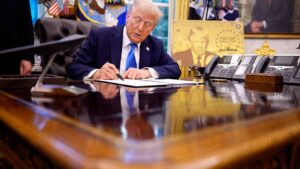ECB Governing Council member Olli Rehn highlighted in a statement that reduction in policy restrictions could commence in June as long as “inflation continues to fall as projected.”
But he also addressed the predominant risks, identifying “geopolitics” as the primary source of uncertainty. He specifically pointed to the “deteriorating situation in Ukraine” and the “possible escalation of the Middle East conflict” as critical factors with potential ramifications on the European economy, especially concerning energy prices and overall economic stability.
Looking ahead to ECB’s June meeting, the council will review an “updated assessment of the inflation outlook, the dynamics of underlying inflation, and the strength of monetary policy transmission.”
This upcoming analysis will be crucial in determining whether ECB has sufficient confidence that inflation is sustainably converging towards its target, leading to a decision to “start to ease the stance of monetary policy and cut interest rates.”
However, Rehn cautioned that this prospective easing is conditional on the absence of “further setbacks, for instance in the geopolitical situation and therefore in energy prices.”









